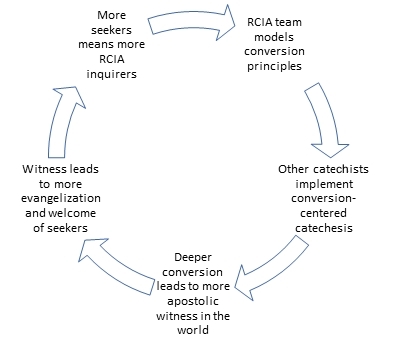
As an RCIA team member, you probably realize that you are a model for the catechumens. What you may not realize is that you are also a model for the rest of the catechists in the parish.
The General Directory for Catechesis says that the baptismal catechumenate is the model for all catechesis (see #59). When I first read that, I thought that meant that the rest of the parish catechists should read the Rite of Christian Initiation of Adults. And while they probably should, that’s not going to happen.
Next I thought it meant that the rest of the parish catechists should come sit in on some RCIA catechetical sessions and learn from us. Again, not going to happen.
How do parish catechists learn from the RCIA team?
Finally I realized that what it means for the catechumenate to be the model for all catechesis is that we, the RCIA team members, have to be living out the principles of the RCIA in the parish in such a way that we get noticed.
Now you may be wondering why it should be your job to go out and be good examples to the other catechists in the parish. The reason is that you are setting up a virtuous circle that benefits your RCIA process.
How RCIA teams start a virtuous circle
If you model the core principles of an initiation process that is fundamentally focused on the conversion of the catechumens, and if you do so in such a way that other catechists begin to notice, they will in turn begin to implement conversion-centered catechetical processes in their programs.
RCIA teams can start a virtuous circle of conversion-centered catechesis in their parishes.
That will then lead to an increase in the number of missionary disciples in your parish who are out in the world evangelizing.
And more evangelization means more RCIA inquirers. Which then gives you more opportunities to model conversion-centered catechetical principles to the rest of the catechists. And so on.
So what are the principles of the RCIA process? There are six, and they are found in paragraphs 4 and 5 of the RCIA:
4. The initiation of catechumens is a 1gradual process that takes place within the 2community of the faithful. By joining the catechumens in reflecting on the value of the 3paschal mystery and by renewing their own 4conversion, the faithful provide an example that will help the catechumens to obey the Holy Spirit more generously.
5. The rite of initiation is suited to a 5spiritual journey of adults that 6varies according to the many forms of God’s grace, the free cooperation of the individuals, the action of the Church, and the circumstances of time and place.
Do you agree?
Should RCIA teams be setting examples for the other parish catechists? What are some steps your RCIA team is taking to do be an example of conversion-centered catechesis?








